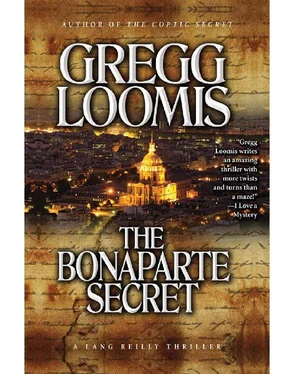Gregg Loomis - The Bonaparte Secret
Здесь есть возможность читать онлайн «Gregg Loomis - The Bonaparte Secret» весь текст электронной книги совершенно бесплатно (целиком полную версию без сокращений). В некоторых случаях можно слушать аудио, скачать через торрент в формате fb2 и присутствует краткое содержание. Жанр: Триллер, на английском языке. Описание произведения, (предисловие) а так же отзывы посетителей доступны на портале библиотеки ЛибКат.
- Название:The Bonaparte Secret
- Автор:
- Жанр:
- Год:неизвестен
- ISBN:нет данных
- Рейтинг книги:3 / 5. Голосов: 1
-
Избранное:Добавить в избранное
- Отзывы:
-
Ваша оценка:
- 60
- 1
- 2
- 3
- 4
- 5
The Bonaparte Secret: краткое содержание, описание и аннотация
Предлагаем к чтению аннотацию, описание, краткое содержание или предисловие (зависит от того, что написал сам автор книги «The Bonaparte Secret»). Если вы не нашли необходимую информацию о книге — напишите в комментариях, мы постараемся отыскать её.
The Bonaparte Secret — читать онлайн бесплатно полную книгу (весь текст) целиком
Ниже представлен текст книги, разбитый по страницам. Система сохранения места последней прочитанной страницы, позволяет с удобством читать онлайн бесплатно книгу «The Bonaparte Secret», без необходимости каждый раз заново искать на чём Вы остановились. Поставьте закладку, и сможете в любой момент перейти на страницу, на которой закончили чтение.
Интервал:
Закладка:
Lang wondered how much weight Patrick had thrown around to accomplish that.
“The Guo-what?” Nanette asked.
“Chinese state security,” Patrick said, taking the champagne bottle from the ice bucket and inspecting the label. “Strange. They wanted an article written by a professor, something about Bonaparte. And were willing to take it at gunpoint.”
Nanette looked from the manuscript in her hand to Lang and back again. “Could they not simply read it when it was published?”
Patrick was pouring into a flute. “We believe they did not want to wait until the article became public. We do not know why. The inscrutable Oriental, no?”
Nanette held up the papers in her hand, puzzled. “Why would Chinese want…?”
Patrick forgot the champagne. “Is that it? Is that the article on Bonaparte by your friend Henri D’Tasse?”
Even more confused. “Yes, yes it is. I was translating it for Lang.”
Patrick sat on the sofa, glass in one hand, the other fishing for the box of Gitanes. “Please, start at the beginning and read it to both of us.”
Twenty minutes later, she finished.
Lang was staring into space. “He left his most prized possession to his secretary’s namesake? Who would that be? And what was it he left?”
Patrick held up the champagne bottle, ruefully noting it was empty. “There is a computer on the table in our bedroom. The answer to your first question could be sought on Google. But first there is the matter of dinner. On the other side of Sacre-Coeur there is a bistro with the best moules frites, mussels and fried potatoes, in Paris. We can easily walk there.”
Jesus, does this guy ever get tired of seafood?
Seated at a small and dimly lit table, Lang barely noticed the muted hubbub around him. His thoughts were on Saint Denis’ diary. What could Napoleon have had that was so precious to him? The obvious answer was the contents of the box that kept reoccurring in the diary’s frequently disjointed passages, the box that was brought from Egypt, was taken to Haiti by Leclerc and returned by his widow. But what was in the box? Alexander’s mummy-or what was left of it? Of everything Napoleon possessed, that would be a macabre favorite. Was its present location somehow revealed by his secretary? The Chinese must have thought so; otherwise what would they want with a soon-to-be-published scholarly article?
And Saint Denis’ namesake.
A son?
Lang stopped, a mussel speared on a fork halfway to his mouth.
Wait a second.
The diary did not mention a namesake; he had just assumed that was what was meant. The words were in your name. Was the distinction important?
“You do not like the moules?” Patrick asked, interrupting Lang’s thoughts.
Lang ate the one on his fork. “No, er, I mean, yes. They’re quite good.”
Nanette studied Lang’s face. “I think perhaps he has… what is the phrase? Something on his mind.”
“I was thinking about Saint Denis’ diary and what Napoleon meant when he said he was leaving his most precious possession.” He paused a moment. “What does the name Saint Denis mean to you?”
“It is the location of the Paris football stadium,” Patrick answered immediately. “The Pomme de Pain there has closed, to be replaced by a McDo’s…”
A popular version of French fast food, a sandwich chain, had been replaced by McDonald’s, “McDo” in Parisian slang. Lang wanted to head off a discussion of American fast food, which the French blamed for, among other things, the current world economic problems, global warming and the collapse of Western civilization. In spite of the antagonism, KFC, Subway and Pizza Hut, to name a few, attracted a large following in Paris.
“The football stadium,” Lang repeated. “Is Saint Denis the street address?”
“It is the area where it is located,” Nanette interjected, “a suburb north of Paris. It is also the location of a very old church, the one where all but three of the kings of France after the tenth century were buried in the crypt.”
“Could Napoleon have left his prized possession to a church?” Lang asked skeptically. “I mean, the revolution was anticlerical.”
“It was he who returned the building to the church. The revolutionaries had confiscated all of them,” Nanette said.
Patrick used a paper napkin to wipe the mussels’ juice from his lips. “Not only did they confiscate the basilica of Saint Denis, they opened all the royal tombs in the crypt and dumped the remains into a common pit. Later, when the basilica was restored to the Catholic Church, it was impossible to tell which was which. The various relics went into a common ossuary.” He glowered at Lang and Nanette as though this disposed of the matter and there was no need to continue this breach of French dinner-table etiquette. “Now, who would like another glass of wine?”
Unabashed, Lang asked, “So none of the kings are in their tombs?”
Patrick looked at his wife, daring her to answer.
She did anyway. “Not quite so. Ironically, the last two Bourbons are the only ones who have their own resting places today.”
“I thought Louis XVI was dumped in an unmarked grave with his wife, Marie Antoinette, following about nine months later,” Lang said.
“True,” Nanette responded. “Their bodies, along with about twenty-eight hundred other victims of the guillotine, were disposed of in that way.”
“Then how did they wind up in Saint Denis?”
“A lawyer, a secret royalist, lived nearby. He saw both the headless royal bodies dumped there and marked the places in his mind. Later, he bought the little garden where they had been treated so rudely and planted trees over the site. When Louis XVIII came to power after Bonaparte was defeated the first time, he had the bodies removed to Saint Denis and a monument erected in January of 1815. There were only skulls and a few bones and part of a lady’s garter left because the bodies had been covered with quicklime.”
Patrick put down his fork, disgusted. “This talk of bodies and guillotines does not go well with dinner, no? Let us discuss it afterward.”
Lang thought a moment, either not hearing or ignoring his friend. “A monument after a mass grave? That would be a return from anonymity, would it not? And Saint Denis, the church, would be ‘in the name of’ the guy writing the diary. And what better place for Alexander’s mummified body, or whatever is left of it, than a crypt?”
He stood, forgetting his half-eaten meal. “How long will it take to get to this church?”
Patrick looked up at him as though Lang had uttered some particularly vile blasphemy by suggesting the meal not be finished. “The church would be closed by now. Sit, enjoy your dinner.”
Another thought made Lang sit. “But how could Napoleon put anything there? He was on Elba until the spring of 1815.”
“He had many followers eager to do his bidding, as witnessed by how quickly he raised an army after his escape,” Nanette offered. “And he returned to Paris straight from Elba, presumably with full access to Saint Denis or any other church in the city. But do not consider going to Saint Denis at night. The area is not safe.”
Lang was on his feet again. “You can bet the Chinese aren’t worried about safety. We have to get whatever is in that church before they figure out what Napoleon meant.”
He signaled frantically for the check. “I can’t wait.”
With a sigh of resignation, Patrick stood. “And I cannot allow you to go to the Saint Denis area alone and at night.”
2 rue de Strasbourg
Basilique Saint Denis
An hour later
Stopping only for Patrick to go by his apartment and retrieve two flashlights and his PAMAS G1 with two extra clips of ammunition, it still seemed to Lang that the Metro took forever to deliver them to Saint Denis. The station was one of the few he had seen that was dirty, littered, and streaked with graffiti, a preview of the shabby neighborhood it served. The small number of passengers disembarking the train here appeared to be of North African descent, the women with heads covered and the men bearded.
Читать дальшеИнтервал:
Закладка:
Похожие книги на «The Bonaparte Secret»
Представляем Вашему вниманию похожие книги на «The Bonaparte Secret» списком для выбора. Мы отобрали схожую по названию и смыслу литературу в надежде предоставить читателям больше вариантов отыскать новые, интересные, ещё непрочитанные произведения.
Обсуждение, отзывы о книге «The Bonaparte Secret» и просто собственные мнения читателей. Оставьте ваши комментарии, напишите, что Вы думаете о произведении, его смысле или главных героях. Укажите что конкретно понравилось, а что нет, и почему Вы так считаете.












